My starter finally kicked into gear yesterday afternoon (started, Sunday 26th, March). It looked ready so I had a go at a lunch loaf. After a nice and quick first rise I shaped the dough and let it sit for a couple of hours before putting in my little proofer thingy. It didn't seem to be going well so I decided I was going to put in the fridge before going to bed. I forgot about it until I was on my way to bed when I noticed it was ready to bake, so on goes the oven at 12:30 at night. I took it out of the oven around 1:30 wrapped it in a tea towel and went to bed. A little small but I didn't have enough starter which also went into the fridge for the first time last night.

 This morning I took the starter out of the fridge put some in a coulpe of containers and then fed them. And late this afternoon I was ready to go again. This was also my first use of my new vienna trays. I'll post a picture of the crumb later when I cut one.
This morning I took the starter out of the fridge put some in a coulpe of containers and then fed them. And late this afternoon I was ready to go again. This was also my first use of my new vienna trays. I'll post a picture of the crumb later when I cut one.

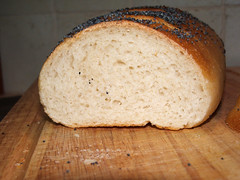 All up not bad results for my first go at artisan bread. I used a 1:1 bakers flour and water starter which was fed irregulary, once or twice a day. I used the following formula and did not take any notice of the various temperatures.
All up not bad results for my first go at artisan bread. I used a 1:1 bakers flour and water starter which was fed irregulary, once or twice a day. I used the following formula and did not take any notice of the various temperatures.

 This morning I took the starter out of the fridge put some in a coulpe of containers and then fed them. And late this afternoon I was ready to go again. This was also my first use of my new vienna trays. I'll post a picture of the crumb later when I cut one.
This morning I took the starter out of the fridge put some in a coulpe of containers and then fed them. And late this afternoon I was ready to go again. This was also my first use of my new vienna trays. I'll post a picture of the crumb later when I cut one.

 All up not bad results for my first go at artisan bread. I used a 1:1 bakers flour and water starter which was fed irregulary, once or twice a day. I used the following formula and did not take any notice of the various temperatures.
All up not bad results for my first go at artisan bread. I used a 1:1 bakers flour and water starter which was fed irregulary, once or twice a day. I used the following formula and did not take any notice of the various temperatures.
- 100% -- Bakers Flour
- 100% -- Starter
- 35% -- Water
- 2% -- Salt
- 1% -- Sugar
- 1% -- Olive Oil
- 1% -- Lecithin Granules
- 1% -- Light Dry Malt
- KazaKhan's Blog
- Log in or register to post comments
I pulled this out of the oven around 10:30 last night.
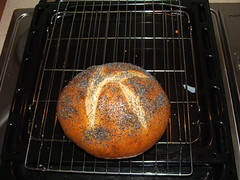
 And this just a few hours ago...
And this just a few hours ago...

 Same recipe as above except 110% starter and 2% lecithin granules. The crumb was very light and soft. I did not think I'd have much success using a starter...
Same recipe as above except 110% starter and 2% lecithin granules. The crumb was very light and soft. I did not think I'd have much success using a starter...

 And this just a few hours ago...
And this just a few hours ago...

 Same recipe as above except 110% starter and 2% lecithin granules. The crumb was very light and soft. I did not think I'd have much success using a starter...
Same recipe as above except 110% starter and 2% lecithin granules. The crumb was very light and soft. I did not think I'd have much success using a starter...- Log in or register to post comments
You really are on your way! U make such great looking loaves.
I do OK with the the paltry rounds I make..someday I hope..
I can do as well..
- Log in or register to post comments
Thank you, I've been baking everyday with the starter and even have a rye starter going now too. Some more pics... (easter buns used fresh yeast)
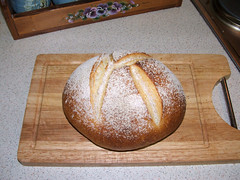
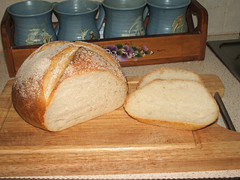
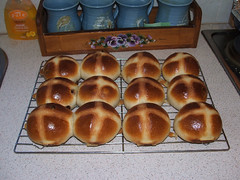
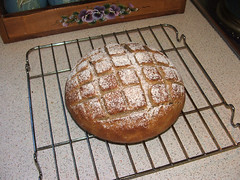








- Log in or register to post comments
Kazakhan, one question about the fabulous bread you're making.
Do you really use the same weight of starter as of flour? I.e., you would have say 700 grams bread flour and 700 grams starter, the starter being at 100% hydration (equal weight flour and water)?
The methods I follow use 100% flour, 68% water, 30% leaven about 2% salt. This also produces excellent bread.
If you do, it just shows what an amazing amount of leeway there is - no hard and fast rules seem to apply!!
Andrew
- Log in or register to post comments
Yes I do use the starter at 100% of flour weight. I use 100% so I can get a rise in a similar time to commercial yeast. I generally use a three hour bulk ferment thats three hours from the time I start mixing to the time it goes into the oven. That is my understanding of bulk fermenting others seem to have a different idea.
- Log in or register to post comments
Bulk, or first, fermentation time is typically defined as the time between the completion of the mix and the division of the dough. The proof, or second fermention, time is typically the time from when the dough is shaped to when it goes into the oven. You may want to rethink your understanding of bulk fermentation.
- Log in or register to post comments
That is what is mentioned in my TAFE workbook but that is not how we do it. For the time being I will not be rethinking my understanding of bulk fermentation. My assesment includes calculating bulk ferments from the time I start mixing to the time I put the dough into the oven. I believe we are doing it this way to make the calculation of yeast % easier. I'll ask when I get back TAFE in two weeks why we're not following the standard. I also see that you say typically which of course implies it is not a rule.
- Log in or register to post comments
From The Bread Bakers Guild of America, Bread Lines, Vol. 12, No. 3, Bulk Fermentation Time is "the period that elapses from the time the dough is mixed until it is divided into individual loaves." I could cite many other, equally authoritative references. Of course, one could chose to define a term in any way one wishes; just don't expect to be well understood by serious artisan bakers.
- Log in or register to post comments
I'll concede that twice now I've failed to articulate myself very well however I was looking for some insight on the descrepancy and not an argument about the definition. I've already mentioned I'll inquire as to why we're doing things a little differently when I get back to the institute at which I study. And being well respected in Australia for the bakers they produce I'm sure they take the definition of bulk fermentation seriously.
I'm currently studying Food Processing (Retail Baking - Combined).
- Log in or register to post comments
Right KazaKhan. I've got it now. Personally I prefer a longer proofing time - I find the "sourness" comes through better after around 6 hours from shaping.
Some of mine have been in a cool enough place to take up to 13 hours from shaping and the flavour was superb. Almost lemony.
The last two I've made have been much faster and I miss the bigger flavours - which I feel are the ppoint of sourdough. So if my starter has become terminally rapid, then I'll take to putting the loaves in the fridge overnight once shaped, to slow it down enough to build flavour, then bake next day.
- Log in or register to post comments
Five hour bulk (yes the non-typical kind) is the longest I use. I don't like stretching my breadmaking overnight. Also I'm not into sour tasting bread fortunately for me my starter is far from sour.
- Log in or register to post comments
I was having a dickens of a time coaxing any sour flavor from my sourdough. Turns out, I was proofing it too hot. I use a cooler with a cup of boiling water poured in the bottom as a proofbox in the winter, and I was keeping it at about 85 degrees (I can adjust the temperature by keeping the lid open and watching the reading on the instant-read thermometer).
Finally, last weekend, I just let that sucker proof in my cold New England house (64 degrees). The first bulk fermentation took 4 hours, then I folded and degassed it for the second bulk fermentation. (It's a 100 percent whole wheat sandwich bread, so I'm not going for huge holes -- the second fermentation helps make the final loaves rise higher and also gets rid of most of the whole-wheat grassy taste). Second fermentation took about two hours, then the final proofing after shaping took another 2 hours.
Tasted GREAT. Nice and sour.
So I agree, for sourness, cooler and longer = more sour and better tasting bread.
- Log in or register to post comments
J Monkey - I find that a slower fermentation really helps flavour too! My last two bakes were with dough which was very vigorous (I mill my own flour and they were with a new wheat - must be super food for the little yeasties!!) and they were blander in flavour than I like - I may as well have used commercial yeast!
KazaKhan, bulk fermentation relates specifically to while the dough is fermenting in total - i.e. in bulk. This can be one, two or (rarely) three bulk ferments - but the dough has NOT been split up into smaller units. Once finally divided and shaped, prior to baking, then it is referred to as proofing.
You can invent a name, for your own convenience, of the time from mixing the intial dough to the time it goes into the oven - and a good one is needed. Let me know! I'll adopt it!
- Log in or register to post comments
I thought after my last post I could forget this bulk ferment tripe. As for inventing a name there is no need it is called D.T.O (dough to oven). From the Bulk Fermented section of my workbook:-
And a little further on:-
I was wrong earlier we go from the finished knead time (not the start as I previously said) to the into the oven time. So for example if I was to finish mixing at 8am the dough would be into the oven at 1pm for a five hour D.T.O.(technically a 3hr 45min bulk ferment) however in class we are not using the term "5 hour D.T.O" we are calling it a "5 hour bulk ferment". And for the third time now, I'll ask when I get back to class why we've broken from the traditionally accepted definition.
I take issue with the implication that I'm inventing terms and definitions. As I've already pointed out twice this is what I've been taught in my commercial baking course and for the last time I'll inquire as to why as soon as I get the chance...
- Log in or register to post comments
Personally, I don't care how anyone defines bulk fermentation.
Who cares?..this site is for amateurs and enthusiasts. Granted,
it's nice to be informed about the techno stuff..but I don't think
the subject needs to be beaten to death! Kaza..keep doing what you're
doing..cause you do it very well!!
- Log in or register to post comments
Thanks again, I really appreciate it. I haven't made any bread in the last two days which is the longest I've gone in over eight weeks, time to get back into it...
- Log in or register to post comments
DTO is an excellent description!
My last sourdough was astonishingly quick - too quick, came out blander than I like - but using 30% of total dough weight, it took about 8 hours DTO. (And that included activating the starter, letting that get started up, mixing the dough etc etc.) Usually takes nearer to 24.
If it behaves like this again, I shall have to raise the dough in the fridge.
- Log in or register to post comments